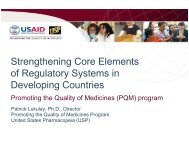Charles Millikan - Institute of Medicine
Charles Millikan - Institute of Medicine
Charles Millikan - Institute of Medicine
Create successful ePaper yourself
Turn your PDF publications into a flip-book with our unique Google optimized e-Paper software.
IOM Report: Spirituality in HealthcareThe Rev. <strong>Charles</strong> R. <strong>Millikan</strong>, D. MinVice-President for Spirituality and Values IntegrationThe Methodist Hospital System1
Spirituality in HealthcareSpirituality has been difficult to integrate intohealthcare:1. Limitations <strong>of</strong> defining spirituality2. Spirituality is very different than anythingtraditionally encountered in the acute caresetting.3. Healthcare pr<strong>of</strong>essionals don’t know howto address spirituality in patient care.2
What is a Spiritual Need? An indication <strong>of</strong> unfinished businesso “I just feel like there’s more I could havedone in my relationship with my daughter.” A need to experience nature A need to have involvement and controlo “I want to control how the last few days <strong>of</strong>my life are lived.” A need to relate to God or an ultimate other• “Maybe I should have read the Bible more.”3
What is a Spiritual Need?A Need to:Have gratitude and optimismo “I need hope to make it through this.”Love otherso “I need my wife by my side. She’s my rock.”Receive from otherso “I want to take care <strong>of</strong> myself. I don’t want to bea burden on others.” Create meaningo “Why is this happening to me?4
Role <strong>of</strong> Chaplains Restore feelings <strong>of</strong> connectedness Address spiritual pain
Role <strong>of</strong> Chaplains Acknowledge spiritual distresso Use standardized instruments—FICA Integrate into treatment plan6
Non-Denominational Serve patients <strong>of</strong> all faiths and <strong>of</strong> no faith andprotect patients against proselytizing.7
Non-DenominationalStandards <strong>of</strong> chaplaincyo Outcomes <strong>of</strong> CPE Level II: “Studies must be ableto provide pastoral ministry to diverse people,taking into consideration multiple elements <strong>of</strong>cultural and ethnic differences, social conditions,systems, and justice issues without imposing theirown perspectives.” (Pastoral Competence, CPE)o APC: For certification, the candidate must be ableto “function pastorally in a manner that respectsthe physical, emotional, and spiritual boundaries<strong>of</strong> others.”8
Leading <strong>Medicine</strong>The Methodist Hospital System Mission“To provide high quality, cost-effective healthcare that delivers the best value to the peoplewe serve in a spiritual environment <strong>of</strong> caring inassociation with internationally recognizedteaching and research.”9
Leading <strong>Medicine</strong>: Values and Culture• Faith-based ministry• I CARE values• Patient-centered care:─ Service─ Quality─ Safety• Community benefit support• Engagement <strong>of</strong> our physicians• Commitment to education and research• Attention to staff needs10
Historical PerspectiveThe Methodist ExperienceThe Methodist ExperienceSystem IntegrationThe Patient Experience20072012ServicePride2005ICARE Values2003200211
Leading <strong>Medicine</strong>The Methodist Hospital SystemSpiritual CareRev. <strong>Charles</strong> R. <strong>Millikan</strong>, D.Min.Vice PresidentSpiritual Care & Values IntegrationTMH Medical Center Willowbrook Sugar Land San JacintoRev. Bob KiddDirectorRev. Mark Young, D.Min.DirectorRev. Bill BrossDirectorRev. Linda TolonDirectorWest HoustonRev. Craig BradleyDirector12
Spiritual environment <strong>of</strong> healingBlessing <strong>of</strong> the handsNurses week 2013Jesus: The GreatPhysician13
Leading <strong>Medicine</strong>Bereavement Ministry• Chaplains attend every death, including miscarriages and infant deaths• Letters are sent to every family who has had a loved one die in the hospital,expressing sorrow, acknowledging grief and resourcing them with local griefsupport group information• Invitations to a memorial service are sent to every family who has had a loved onedie in the hospital (Two Memorial Services a year)• We have a No One Dies Alone (NODA) program that provides compassionatecompanions to be with patients at end <strong>of</strong> life who do not have family or friends14
Leading <strong>Medicine</strong>Collaboration (Internal & External)• Chaplains attend every code in the hospital (pare <strong>of</strong> Code Team)• Chaplains attend interdisciplinary rounds on clinical units• Chaplains assist physicians in difficult conversations (Compassionate CareConversations)• Chaplain(s) are represented on the Biomedical Ethics Committee and consult team• SCE partners with (and trains) lay persons from our local community <strong>of</strong> several faithtraditions who come in on a weekly basis to provide spiritual care, which expands ourreach within the hospital; 182 TMHS Lay Ministers and 33 Faith Group Volunteers (6different traditions)15
Leading <strong>Medicine</strong>Challenges• Spiritual Care as a Center <strong>of</strong> ExcellenceFor Spiritual Care to thrive, it must work incollaboration with all the services <strong>of</strong> the hospitalsystem and not be isolated to just a chapel.Spiritual Care is holistic.16
Practical Tips for Faith-Based HospitalsPractical Tips• Develop Institutional Mission and Vision Statements17
Leading <strong>Medicine</strong>The Methodist Hospital System Mission“To provide high quality, cost-effective healthcare that delivers the best value to the peoplewe serve in a spiritual environment <strong>of</strong> caringin association with internationally recognizedteaching and research.”18
Leading <strong>Medicine</strong>The Methodist Hospital Statement <strong>of</strong> Belief“The Methodist Hospital, a Christian organizationestablished by the Texas Annual Conference <strong>of</strong> theUnited Methodist church, exists to provide qualityhealth care services. As it fulfills this purpose, theSystem participates in the redeeming activity <strong>of</strong> Godthat makes the world a better place for allhumankind. This health system is based on the beliefGod can heal through the lives, actions, and words <strong>of</strong>persons, regardless <strong>of</strong> various religious perspectives.Therefore, in all endeavors The Methodist HospitalSystem strives to treat everyone as a person <strong>of</strong>sacred worth and value, created by God.”19
Leading <strong>Medicine</strong>Practical Tips• Collaborate and Partner with Faith Based Communities20
Leading <strong>Medicine</strong>Community Benefits• Bering Omega CommunityServices• Communities in SchoolsHouston, Inc.• Eye Care for Kids Foundation• Ft. Bend Family HealthCenter, Inc.• Houston Hospice• Krist Samaritan Center forCounseling and Education• Matagorda Episcopal HospitalOutreach Program• Montrose Counseling Center, Inc.• Northwest Assistance Ministries• San Jose Clinic• Seven Acres Jewish Senior CareServices• Shalom Mobile Health Ministries• Sheltering Arms Senior Services• The Community Clinic• The Women’s Home• TOMAGWA Health Care ministries21
Practical Tips for Non-Faith BasedHospitals There should be a commitment to chaplaincy. Chaplains can and should address spiritualconcerns, even in a non-faith based hospital22
References1. Jacobs MR. What are we doing here? Chaplains incontemporary health care. The Hastings CenterReport. 2008; 38(6): 15.2. Ferrell B and Munevar C. Domain <strong>of</strong> spiritual care.Progress in Palliative Care. 2012; 20(2): 66.23
Questions?24


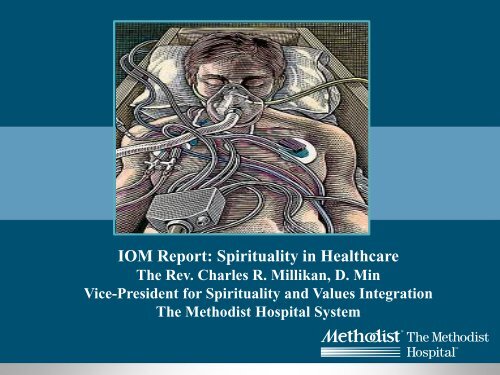
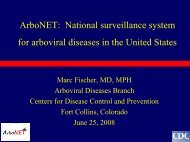

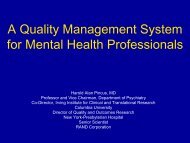
![Barry Davis Presentation.ppt [Read-Only] - Institute of Medicine](https://img.yumpu.com/31160415/1/190x146/barry-davis-presentationppt-read-only-institute-of-medicine.jpg?quality=85)
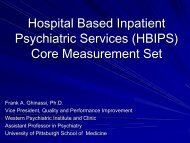
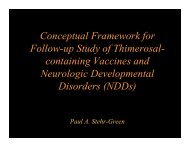
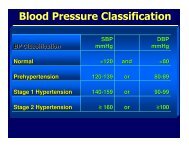


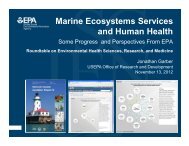
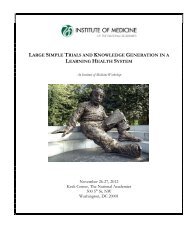
![Diekema.ppt [Compatibility Mode] - Institute of Medicine](https://img.yumpu.com/5085552/1/190x146/diekemappt-compatibility-mode-institute-of-medicine.jpg?quality=85)
